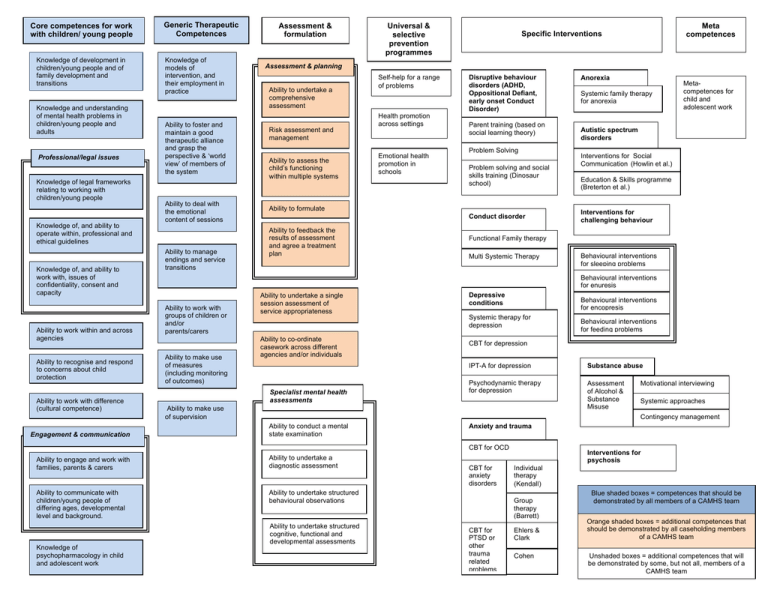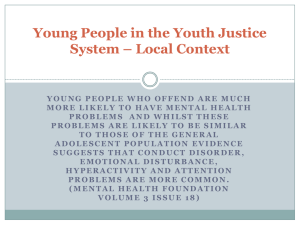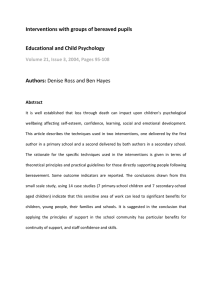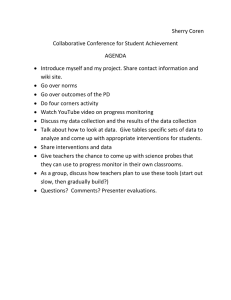Generic Therapeutic Universal & Core competences for work Meta
advertisement

Core competences for work with children/ young people Knowledge of development in children/young people and of family development and transitions Knowledge and understanding of mental health problems in children/young people and adults Professional/legal issues Knowledge of legal frameworks relating to working with children/young people Knowledge of, and ability to operate within, professional and ethical guidelines Knowledge of, and ability to work with, issues of confidentiality, consent and capacity Ability to work within and across agencies Ability to recognise and respond to concerns about child protection Ability to work with difference (cultural competence) Engagement & communication Generic Therapeutic Competences Knowledge of models of intervention, and their employment in practice Ability to foster and maintain a good therapeutic alliance and grasp the perspective & ‘world view’ of members of the system Ability to deal with the emotional content of sessions Ability to manage endings and service transitions Assessment & formulation Universal & selective prevention programmes Assessment & planning Ability to undertake a comprehensive assessment Risk assessment and management Ability to assess the child’s functioning within multiple systems Self-help for a range of problems Health promotion across settings Emotional health promotion in schools Disruptive behaviour disorders (ADHD, Oppositional Defiant, early onset Conduct Disorder) Parent training (based on social learning theory) Problem Solving Problem solving and social skills training (Dinosaur school) Ability to formulate Conduct disorder Ability to feedback the results of assessment and agree a treatment plan Anorexia Systemic family therapy for anorexia Metacompetences for child and adolescent work Autistic spectrum disorders Interventions for Social Communication (Howlin et al.) Education & Skills programme (Breterton et al.) Interventions for challenging behaviour Functional Family therapy Multi Systemic Therapy Behavioural interventions for sleeping problems Behavioural interventions for enuresis Ability to work with groups of children or and/or parents/carers Ability to make use of measures (including monitoring of outcomes) Ability to undertake a single session assessment of service appropriateness Ability to co-ordinate casework across different agencies and/or individuals Specialist mental health assessments Depressive conditions Behavioural interventions for encopresis Systemic therapy for depression Behavioural interventions for feeding problems CBT for depression IPT-A for depression Substance abuse Psychodynamic therapy for depression Assessment of Alcohol & Substance Misuse Ability to make use of supervision Motivational interviewing Systemic approaches Contingency management Ability to conduct a mental state examination Anxiety and trauma CBT for OCD Ability to engage and work with families, parents & carers Ability to undertake a diagnostic assessment Ability to communicate with children/young people of differing ages, developmental level and background. Ability to undertake structured behavioural observations Knowledge of psychopharmacology in child and adolescent work Meta competences Specific Interventions Ability to undertake structured cognitive, functional and developmental assessments CBT for anxiety disorders Interventions for psychosis Individual therapy (Kendall) Group therapy (Barrett) CBT for PTSD or other trauma related problems Ehlers & Clark Cohen Blue shaded boxes = competences that should be demonstrated by all members of a CAMHS team Orange shaded boxes = additional competences that should be demonstrated by all caseholding members of a CAMHS team Unshaded boxes = additional competences that will be demonstrated by some, but not all, members of a CAMHS team





